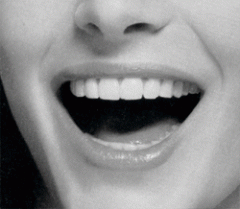Tooth loss is the nation’s biggest confidence fear, even though most adults leave gum disease untreated, says a new survey.
The State of the Nation’s Gum Health’, launched today, highlights that over half (51%) of adults surveyed, rate tooth loss as their biggest confidence killer, compared to changes in weight (19%) or having a bad skin day (10%)[i].
The report, from the makers of Corsodyl, reveals that many people in the UK know little about gum disease which, if left untreated, can lead to tooth loss. In fact, it seems that many Brits don’t actually care about their gums. Nearly half (48%) of those surveyed admitted that healthy looking gums are not as important as other aspects of their oral health care routine. Only 18% of people said they would visit the dentist about gum problems.
At a time when 83% of people show signs of gum disease[ii], this report aims to persuade Brits that now is the time to become gum aware…
Spotting the signs
If you spit blood when brushing your teeth it can be an early warning sign of gum disease. Today’s report suggests that more than one in 10 people (13%) mistakenly believe spitting blood is normal. According to the findings in the report, almost six out of 10 (58%) people have experienced blood in their spit after brushing teeth at least once in their lives, yet the nation is in a state of confusion about what action they should take:
• Almost a quarter (24%) admit they don’t do anything because it happens all the time
• Only one in ten respondents (10%) would visit their dentist to discuss the problem
• Just one in five (19%) would begin to brush their teeth more regularly
• Less than a quarter (23%) would start to use a mouthwash
Dentist Amit Rai says: “Gum disease is prevalent in Britain and this new report highlights what I see in my practice on a daily basis – that some British adults seem to know little about the health of their gums. Although most patients nowadays understand the importance of brushing twice daily, they don’t often realise that the bugs, which cause gum disease, love to hide within the spaces in-between their teeth. A build up of bugs causes the gums to become inflamed, commonly resulting in red, swollen gums which may bleed upon flossing or brushing. Over time gums could pull away from teeth and, if left untreated, gum disease could result in the scary reality of tooth loss. There are many products available to treat gum disease. Where appropriate, I often recommend a medicated mouthwash, containing chlorhexidine, for short term use to treat the signs of gum disease, as well as a good oral care routine.”
How healthy are your gums?
Healthy gums should look pink and there shouldn’t be any bleeding during brushing, flossing or eating. The gums should have a firm grip on the teeth, forming an arc high up on the teeth. Shockingly, only 10% of people have excellent oral health(ii).
Treating Gum Disease
The best way to prevent gum disease is to follow a good oral care routine including brushing for two minutes twice daily with a fluoride toothpaste and flossing to remove plaque from between teeth. If you do have signs of gum disease, it’s important to tackle the problem quickly to minimise the effects, so visit your dentist for advice. They can advise on treatments for gum disease, including mouthwashes. Mouthwashes are very effective at improving plaque control and gingival health when used alongside tooth brushing.[iii]
To find out more about gum health and gum disease, talk to your dentist or visit www.corsodyl.co.uk
The report was commissioned by the maufacturers of Corsodyl Original Mouthwash 300 ml; Corsodyl Mint Mouthwash 300 ml & 600 ml; Corsodyl 0.2% Mouthwash (Alcohol Free) 300 ml; Corsodyl Spray 60 ml and Corsodyl 1% w/w Dental Gel 50 g. Contains chlorhexidine digluconate to treat gum disease. Always read the label.
[i] Unless otherwise stated all statistics are from Corsodyl consumer research conducted in July 2012, which surveyed 2,000 adults aged 18+ in the UK.
[ii] O’Sullivan, D Lader (eds). 1. Oral health and function – a report from the Adult Dental Health Survey 2009. The Health and Social Care Information Centre, 2011. Pg 6.
[iii] Department Of Health. (2009). Delivering Better Oral Health- An evidence-based toolkit for prevention. 2, pg 33-34

